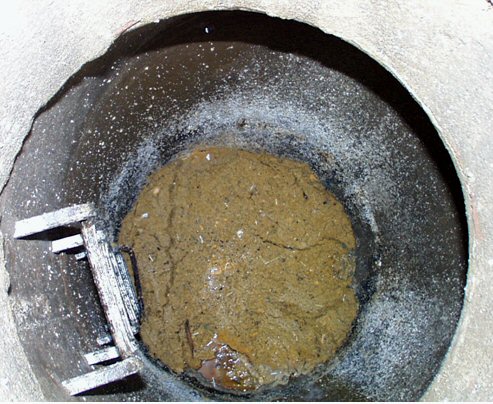Fats, Oils, and Grease Control

Why Did the City of Columbus Need a FOG Reduction Program?
A leading cause of sewer blockages across the U.S. is the accumulation of FOG in the sanitary sewers. The greasy waste enters the sewers through connections from homes, food service establishments, and industrial wastewater dischargers.
FOG blockages may cause sanitary sewer overflows into local waterways and backups into basements of nearby homes and businesses. When homeowners have to hire a plumber to remove grease from their sewer service line, rates vary from $200 - $400 the first hour for response, with additional charges for extra time and after-hours service calls.
A basic grease blockage service call costs the Columbus Division of Sewerage and Drainage at least $2,000 to respond. If the blockage causes a sewer overflow, the City must pay fines for the discharge into the environment. The maintenance costs associated with the blockages are passed along to all sewer rate payers. These additional costs would be unnecessary if the problem did not exist. Clearly, the prevention of grease entering our sewers is the key to solving the problem.
FOG Reduction Program Overview
The Division of Sewerage and Drainage developed a FOG Reduction Program consisting of four main elements outlined below. These changes apply to all food service establishments located within the City of Columbus and to the 22 municipalities* that contract with the City of Columbus for wastewater treatment.
* The 22 communities that contract with Columbus for wastewater treatment include: Bexley, Brice, Dublin, Gahanna, Grandview Heights, Grove City, Groveport, Hilliard, Lockbourne, Marble Cliff, Minerva Park, New Albany, Obetz, Reynoldsburg, Riverlea, Shawnee Hills, Upper Arlington, Urbancrest, Valleyview, Westerville, Whitehall and Worthington.
- Columbus City Code 1145.20 (B) requires all food service establishments in the City's service area to develop and implement a FOG Best Management Plan (BMP) to handle FOG-laden wastes. A key element of the FOG BMP requires the food service establishment to maintain a Grease Interceptor Cleaning Log.
View Columbus City Code 1145.20 (PDF)
- Director's Rule 08-01 establishes grease interceptor cleaning practices for trucked waste haulers licensed with the City of Columbus. The rule also requires licensed trucked waste haulers to completely fill out the food service establishment’s Grease Interceptor Cleaning Log(s) or to communicate the pertinent information to personnel of the food service establishment. Please note this Director's Rule regulates only those trucked waste haulers that are licensed with the City of Columbus.
View Director's Rule 08-01 (PDF)
- Director’s Rule 15-04 establishes a minimum cost recovery charge of $2000 per typical blockage incident attributed to the improper disposal of grease. Cost recovery assessments for sewer blockages requiring more than four hours of effort to correct could be higher.
View Director's Rule 15-04 (PDF)
- Director's Rule 18-03 establishes local limits for the control of discharges of wastewater to the Columbus sewerage system. Wastewater discharges cannot exceed a Hydrocarbon FOG concentration of 200,000 micrograms per liter or equivalent 200 parts per million.
View Director's Rule 18-03 (PDF)
For help on developing your food service establishment's BMP, please print the following documents using Adobe Acrobat:
BMP Form and Interceptor Log (PDF)
BMP Instructions (PDF)
Have you seen this flyer?

The City of Columbus distributes these educational door hangers in neighborhoods that are prone to blockages or have recently experienced a FOG obstruction in the sewer system.
Homeowners should practice the same best management practices as food service establishments:
- Never pour grease into drains, even homes equipped with a garbage disposal. Instead, pour FOG into a sealed container and dispose of container in the trash.
- Scrape food waste into the trash.
- Use paper towels to wipe FOG from pots, pans, plates and utensils prior to washing.
For questions, please contact:
Division of Sewerage and Drainage
Industrial Wastewater Pretreatment Group
1250 Fairwood Ave, Suite 186
Columbus, OH 43206
Phone: (614) 645-5876
Email: [email protected]